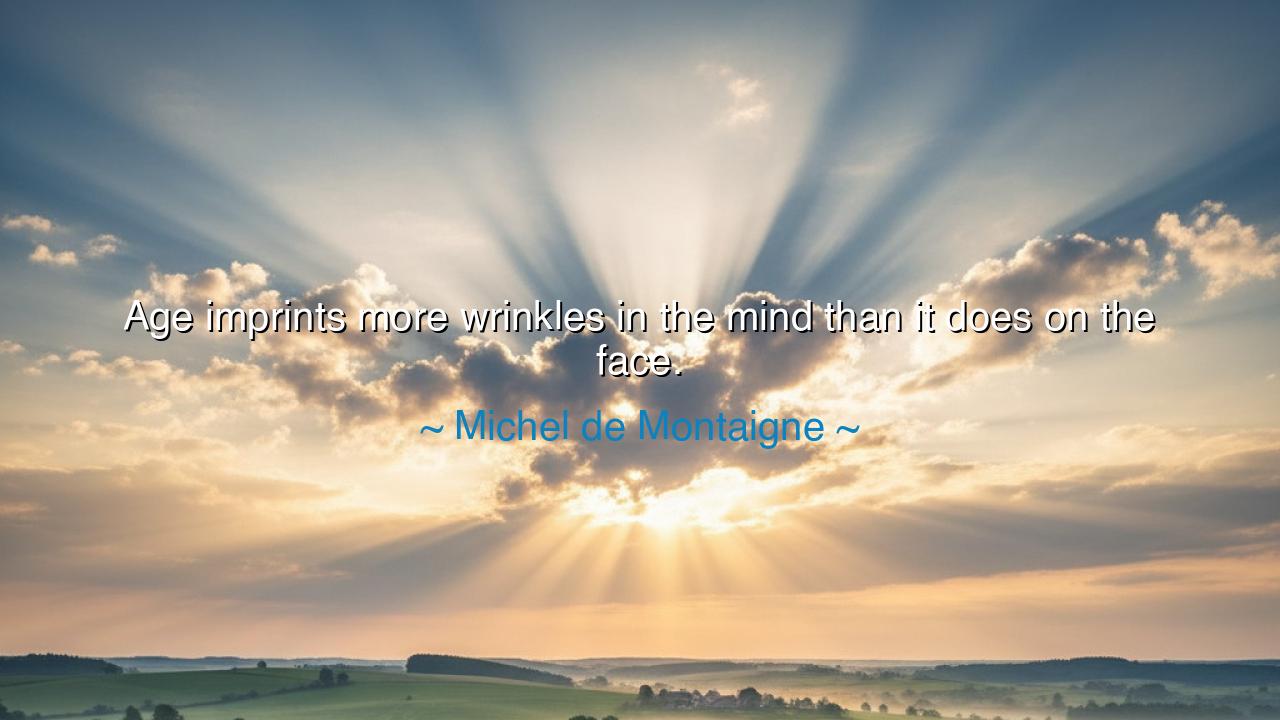
Age imprints more wrinkles in the mind than it does on the face.






“Age imprints more wrinkles in the mind than it does on the face.” — Michel de Montaigne
Thus spoke Michel de Montaigne, the philosopher of self-reflection, the gentle observer of the human spirit. In these few words, he unveils a truth both beautiful and sorrowful: that the true marks of age are not etched upon the skin, but upon the soul. For the passing of years does not merely shape the body — it bends the heart, tempers the will, and carves the thoughts of a lifetime into the mind itself. The wrinkles of the face are visible to all, but the wrinkles of the spirit — those creases of experience, memory, and regret — are the hidden script by which one’s life is written.
Montaigne lived in the age of awakening thought, a time when men first turned inward to understand themselves. His essays, written in solitude in the quiet of his tower, were not born of vanity, but of contemplation. He saw how people feared the appearance of aging, yet remained blind to the greater decay of the inner life — the hardening of belief, the loss of curiosity, the dimming of joy. To him, the mind that ceases to grow, that folds in upon itself like old parchment, suffers a greater aging than the body ever could. For the body grows old by nature, but the mind grows old by neglect.
In his words, one hears both compassion and warning. For Montaigne does not scorn the elderly; rather, he pities those who let time master their spirit. There are those whose faces are smooth but whose thoughts are already weary, who, though young, live as though the fire within them has cooled. And there are others, bent and gray, who remain radiant in soul — whose minds dance with curiosity, whose laughter springs as fresh as youth. Thus, age is not the counting of years, but the state of the heart. The mind, when untended, gathers its own wrinkles — not of wisdom, but of weariness.
Consider Leonardo da Vinci, who in his sixties still dreamed of machines that could fly and worlds yet undiscovered. Though his hand trembled, his imagination soared. His face, lined by time, was but a mask for the ageless genius within. Compare him to the rulers and merchants of his day — men younger in body but older in mind, their spirits dulled by comfort and repetition. In this contrast lies Montaigne’s truth: that life is not measured by duration, but by vitality. The man who continues to question, to learn, to wonder, remains forever young, even as the mirror tells another story.
The ancients understood this well. In the Stoic schools of Greece and Rome, philosophers taught that true aging begins when desire fades — not the desire of the flesh, but the hunger for meaning. Socrates, condemned to die in his seventies, drank his hemlock not with despair but with calm curiosity, as if stepping into another lesson. His mind, unwrinkled by fear, met death as one meets an old friend. The wrinkles of the mind that Montaigne speaks of are not born of time alone, but of fear — fear of change, of loss, of the unknown. To live fully is to resist that fear, to keep the spirit supple and open as a young tree bending to the wind.
Montaigne’s wisdom is thus both a lament and a guide. He teaches that while the body must yield to time, the mind may resist it through engagement, reflection, and growth. Each thought honestly examined smooths the spirit; each curiosity pursued polishes the soul. It is not the years that make us old, but the surrender to monotony — the quiet acceptance that all is known, all is done. The true art of living is to renew oneself constantly, to let experience deepen rather than harden, to let knowledge soften rather than burden.
Practical counsel for the seeker:
-
Guard the youth of your mind as fiercely as the youth of your body. Read, question, and wonder daily.
-
Resist the comfort of certainty; curiosity is the elixir that keeps the heart alive.
-
Reflect often upon your experiences, but do not let them make you cynical — let them make you wise.
-
And when you see wrinkles in the mirror, smile; they are the price of life well-lived. But when you feel wrinkles in your mind — stagnation, bitterness, or fear — smooth them with thought, laughter, and gratitude.
For as Michel de Montaigne teaches, the true aging of a person is not the decay of the flesh, but the drying of the soul. Keep your mind supple, your heart awake, and your wonder alive. Then, though the years may mark your skin, they will never master your spirit. For the face may belong to time — but the mind, when nourished by learning and love, belongs to eternity.






AAdministratorAdministrator
Welcome, honored guests. Please leave a comment, we will respond soon